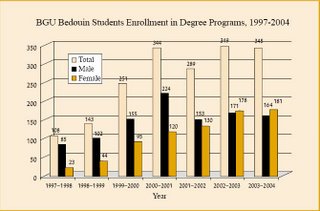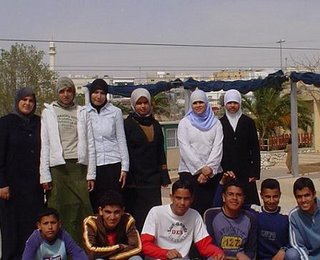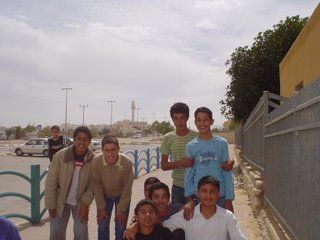 A Product of Affirmative Action: The Education Revolution in the Israeli Bedouin Community
A Product of Affirmative Action: The Education Revolution in the Israeli Bedouin CommunitySource: Newsletter, Vol. 5(2004-5), Center for Bedouin Studies and Development, Ben-Gurion University, Israel
One of the things that infuriates me most about the decision by the British National Association of Teachers in Further and Higher Education (NATFHE) to favour a boycott of Israeli universities is that they are actually hubs of social change. I truly wonder how many of NATFHE's members who supported the boycott have ever visited an Israeli university. Anyone who comes to Ben-Gurion University in Beer Sheva will be struck by the considerable number of Arab students on campus, be they Bedouin from the surrounding area or students from the centre and north of Israel. To someone who has been brainwashed to consider Israel an "apartheid" state, the fact that there are large numbers of Arab students at Israeli universities and colleges is difficult to digest.
Boycott supporters would do well to read a recent Ha'aretz article ("First Israeli Bedouin Woman gets Medical Degree" - May 31, 2006), which mentions an impressive affirmative action program operating at Ben-Gurion University. The program, called "Cultivating Medicine in the Desert", grants big scholarships to bright Bedouin high school students and puts them on a track to medical school, even if they did not attain the high psychometric exam scores (similar to the SAT)required to gain admission. All students accepted to this special program then go through a special "prep year" where they are given intense tutoring as a group. From what I recall, all those who pass the first or second year of the program then join the general stream. Throughout, they retain their scholarships. Recently, a young woman by the name of Rania al-'Uqbi, who was admitted to Ben-Gurion U in the framework of this program, attained her medical degree - she was the first Bedouin woman to do so.
This program and several others like it are all administered by Ben-Gurion University's Center for Bedouin Studies and Development. Basically, this center's main function is to act as a second student services department for Bedouin students and to hand out scholarships to qualified applicants. I've talked to one of the heads of the Center and found out that there are a number of special programs for Bedouin students in Engineering and the Health Sciences. We're talking here about some very aggressive affirmative action for very needy students. What made me really proud is that a very significant share of the funding for these programs comes from North American Jewish donors! The scholarship funds set up by various Jewish donors, a number of which favour Bedouin female students, are one of the reasons for an impressive increase in the number of young Bedouin women studying at the university. At a meeting that I attended in late April at Ben-Gurion U with several groups of Bedouin high school students whom I taught throughout the year, I heard the head of the Center for Bedouin Studies and Development declare that the biggest challenge facing them now is to encourage more Bedouin guys to study and to find enough qualified students for the scholarships.
 A group of my students in Kseife, Israel
A group of my students in Kseife, IsraelAt the high school level, there are also a number of special after-school tutoring programs for students in the Bedouin sector, funded by private (Jewish) foundations, the Ministry of Education and even the German Konrad Adenauer Foundation. I myself taught a group of advanced level students in a special program that funded after-school English classes for 10th and 11th graders to prepare them for their high school matriculation exams (Bagrut). A number of these students will also get full scholarships throughout university and even job placements after they graduate. Contrary to popular perception, the problem in Bedouin schools, in general, from my experience as a teacher in the system, is not so much a lack of funding, but how money is allocated and used.








